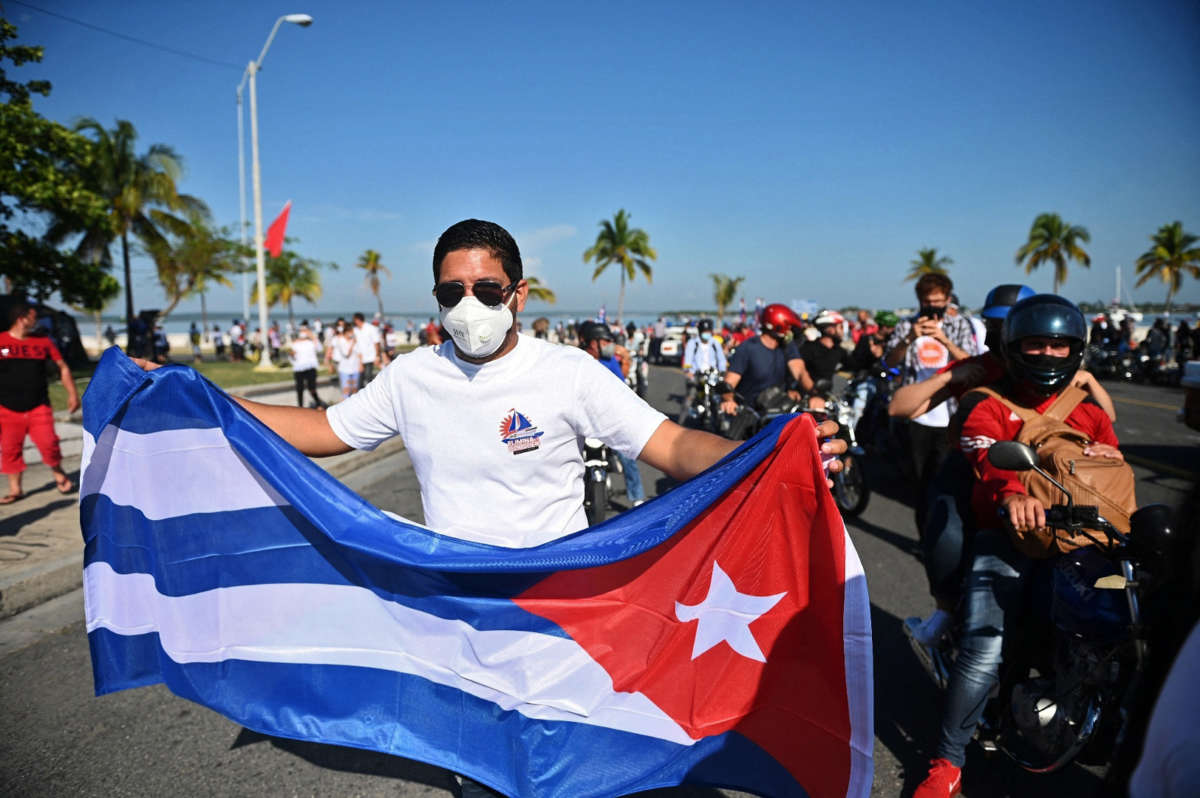Did you know that Truthout is a nonprofit and independently funded by readers like you? If you value what we do, please support our work with a donation.
Peace and human rights advocates joined the United Nations General Assembly Wednesday in their annual condemnation of the United States’ disastrous economic embargo against Cuba.
For the 29th straight year, the members of the General Assembly voted overwhelmingly in favor of a resolution demanding an end to the 60-year U.S. economic blockade on Cuba. This year, 184 nations voted in favor of the resolution, while the U.S. and Israel voted against it. Three nations — Brazil, Colombia, and Ukraine — abstained.
Critics this year noted the detrimental effects of the embargo on Cuba’s ability to combat the Covid-19 pandemic.
Cuban Foreign Minister Bruno Rodríguez Padilla slammed the blockade as a “massive, flagrant, and unacceptable violation of the human rights of the Cuban people” and “an economic war of extraterritorial scope against a small country already affected in the recent period by the economic crisis derived from the pandemic.”
“Like the virus, the blockade suffocates and kills and must end,” Rodríguez told the General Assembly.
Spain’s U.N. delegation said that the U.S. embargo against Cuba “has a detrimental impact on the country’s economic situation and negatively affects the standard of living of the Cuban people.”
Indonesia’s U.N. mission asserted that the blockade “violates norms and principles of international law and sovereign equality of states” and hinders Cuba’s “recovery from the Covid-19 pandemic.”
Sofiane Mimouni, Algeria’s ambassador to the U.N., reaffirmed his country’s “unwavering solidarity with the government and brotherly people of Cuba as well as its support for the lifting of the longstanding and unnecessary embargo imposed on Cuba.”
Mexico’s U.N. mission said it “reiterates its condemnation of the economic, commercial, and financial blockade against Cuba, and calls for its end.”
Rodney Hunter, political coordinator for the U.S. mission to the U.N., countered that sanctions are “one set of tools in Washington’s broader effort toward Cuba to advance democracy, promote respect for human rights, and help the Cuban people exercise fundamental freedoms.”
Although the Obama administration took steps to normalize relations with Cuba, the past 60 years have been characterized by varying degrees of U.S. hostility toward the socialist government and, by extension, the Cuban people.
Having lost effective economic control of the island in 1959 following the successful socialist revolution led by Fidel Castro, successive U.S. administrations waged a decadeslong campaign of state-sanctioned exile terror, attempted subversion, failed assassination attempts, economic warfare, and covert operations large and small in a fruitless policy of regime change. There have been 13 U.S. administrations since the triumph of the Cuban revolution.
According to the Cuban government, U.S.-backed terrorism has claimed nearly 3,500 lives and cost the island’s economy at least hundreds of billions of dollars.
Press freedom is under attack
As Trump cracks down on political speech, independent media is increasingly necessary.
Truthout produces reporting you won’t see in the mainstream: journalism from the frontlines of global conflict, interviews with grassroots movement leaders, high-quality legal analysis and more.
Our work is possible thanks to reader support. Help Truthout catalyze change and social justice — make a tax-deductible monthly or one-time donation today.
